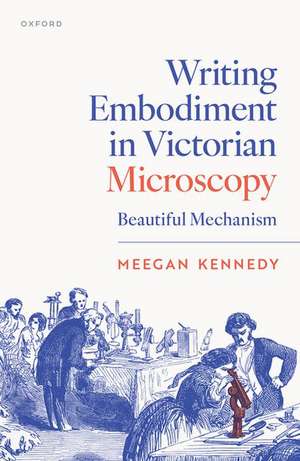Writing Embodiment in Victorian Microscopy: Beautiful Mechanism
Autor Meegan Kennedyen Limba Engleză Hardback – 16 ian 2025
Preț: 680.07 lei
Preț vechi: 972.12 lei
-30% Nou
Puncte Express: 1020
Preț estimativ în valută:
130.15€ • 141.32$ • 109.32£
130.15€ • 141.32$ • 109.32£
Carte disponibilă
Livrare economică 22-28 martie
Preluare comenzi: 021 569.72.76
Specificații
ISBN-13: 9780198939009
ISBN-10: 0198939000
Pagini: 480
Dimensiuni: 165 x 242 x 30 mm
Greutate: 0.84 kg
Editura: OUP OXFORD
Colecția OUP Oxford
Locul publicării:Oxford, United Kingdom
ISBN-10: 0198939000
Pagini: 480
Dimensiuni: 165 x 242 x 30 mm
Greutate: 0.84 kg
Editura: OUP OXFORD
Colecția OUP Oxford
Locul publicării:Oxford, United Kingdom
Notă biografică
Meegan Kennedy is an Associate Professor of English at Florida State University and a founding member of FSU's Health Humanities Initiative. She has taught at Harvard University and Trinity College (Connecticut). She studies the history and culture of Victorian medicine, science, and the novel, with a particular interest in how we gather, verify, and share sense-based knowledge. Her work has been supported by the National Endowment for the Humanities and the Huntington Library, among others. With Piers Hall, she is a General Editor of the Routledge series and database Routledge Historical Resources: Nineteenth-Century Science, Technology, and Medicine.
